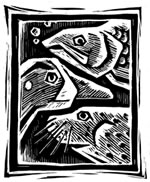- Home
- Restoration Projects
- Project Search
- Social, cultural and economic assessment of kelp mariculture opportunities for coastal villages within the EVOS spill zone 23220301
Project Information
Title: Social, cultural and economic assessment of kelp mariculture opportunities for coastal villages within the EVOS spill zone 23220301
Project Year and Number: 2023: 23220301
Other Fiscal Years and Numbers for this Project: 2026: 26220301, 2025: 25220301, 2024: 24220301, 2022: 22220301
Principal Investigator (PI): Aaron Poe (Alaska Conservation Foundation)
Managing Agency: ADFG
Assisting Personnel: Kevin Berry (University of Alaska Anchorage), Willow Hetrick-Price (Chugach Regional Resources Commission), Dune Lankard (Native Conservancy), Michael Stekoll (University of Alaska Southeast), Thomas Thornton (University of Alaska Southeast)
Research Location:
Restoration Category: Research
Injured Resources Addressed: Not Specified
Abstract:This is a 5-year project to assess how Indigenous kelp mariculture operations within the spill zone would be socially beneficial, economically viable and compatible with local cultural values of coastal communities. In the 30 years since the Exxon Valdez Oil Spill (EVOS), substantial research has been conducted to understand the status of injured species and habitats, yet less work has been directed to evaluate potential strategies that address continued social, cultural and economic impacts (i.e., injured services) to coastal communities in the spill zone. Alaska generally, and the spill zone specifically, now stand at the forefront of an emerging kelp mariculture industry that has demonstrated restorative effects such as improving water quality for ecosystems in other locations. Kelp mariculture has also shown promise to create temporary habitat at key times to buffer important species like herring and salmon from some of the rapid changes now being observed in nearshore habitats (e.g., increased acidity and warmer water temperatures). These broad ecosystem stressors are also challenging the stability of the commercial fishing industry and subsistence harvest of local communities. There is growing recognition of the thoughtful inclusion of kelp mariculture as a critical component to ensure the socioeconomic sustainability of communities in the spill zone. Understanding and establishing the potential benefits of kelp farms in the spill zone relies on baseline data collection including local, Indigenous, traditional ecological knowledge, and a focused analysis of consumer willingness to pay for kelp products from remote coastal communities. Best practices for the kelp mariculture industry will be investigated through the lens of historical ecological and subsistence food knowledge and practices, local Indigenous stakeholders, newly established and future kelp mariculture practitioners, scientists, and fishermen.
This project was approved for the FY22-FY26 funding cycle.
Proposal: View (3,949 KB)
Information and/or Products produced by this project:| Title | Description | Type | Document(s) |
|---|---|---|---|
| Proposal Amendment 5.28.24 | Other |
View (356 KB) |
Reports:
FY23 Annual Report: View (398 KB)
Publications from this Project: None Available
Resolutions: